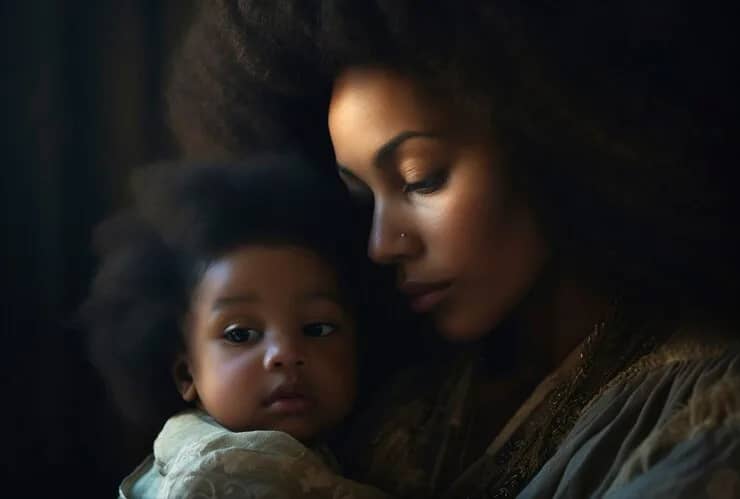Have you ever been in a situation where you’re trying to learn a new dance with your partner, a dance instructor, a friend, or a colleague? If you haven’t, let me give you a sneak peek into my friend’s experience on one such occasion.
Miral, as we fondly call her (her full name is Mirabel), signed up for dance training with a known coach close to our Estate. The first few weeks were exciting until something happened in the fourth week; her coach was under the weather, and she was assigned to another in the interim. Though she didn’t like the idea, she had no choice as the dance competition she was preparing for was fast approaching.
Guess what happened?
The coach kept changing the dance steps without warning, which left Mirabel miserable. Just as Mirabel felt, that’s how confusing it can be for your baby when your mood swings like a pendulum. One moment you’re singing lullabies and showering your baby with kisses, and the next, you’re lost in a fog of sadness or irritability.
Sounds familiar?
Are you aware your baby is like a tiny sponge, soaking up every little detail of his environment? From the sound of your voice to the warmth of your touch, your little one relies on you for everything. So when PPD interferes with your connection, it can affect your baby’s sense of security and stability. To fully understand how PPD can affect your baby, continue reading as I explore the following:
- How PPD impacts your baby’s overall health
- Effects of PPD on your baby’s development
- Nutritional, sleep, and stress effects
- How to prevent postpartum depression from affecting the care of your baby
How PPD Impacts Your Baby’s Overall Health
Postpartum depression isn’t just about you; it directly affects your baby’s well-being too. When you’re struggling with PPD, it can make it harder to give your baby the care and attention they need – feeding, soothing, bathing, and everything your baby relies on you for. Having PPD can disrupt routines, and lead to inconsistent care, which will, in turn, impact your baby’s physical health, emotional development, bonding, and overall sense of security.
Some studies suggest that babies whose mums go through Postpartum depression may experience delays in developmental milestones, behavioral issues, and insecure attachments with their mothers. This means that taking care of yourself is important to both you and your baby.
Effects of PPD on Your Baby’s Development
Postpartum depression doesn’t just affect your mood; it can also have a significant impact on your baby’s development. Here’s how:
Your baby’s brain is rapidly developing during the first few years of life, and since you’re dealing with PPD, it can be challenging for you to engage in the interactive play, and stimulation that are essential for the cognitive development of your baby. This can delay language skills, problem-solving abilities, and overall cognitive development.
Also, your baby’s physical health is closely linked to their emotional well-being. But with PPD, it can be difficult for you to provide consistent care, including feeding, hygiene, and healthcare for your baby.
Other ways PPD can affect your baby:
- Nutritional challenges: Feeding your baby is one of the most important things you’ll do as a mum. But when PPD hits, it can throw a wrench in the works. Whether it’s struggling with breastfeeding, finding the energy to prepare nutritious meals, successfully introducing solid food to your baby’s meal plan, or inconsistent feeding patterns, PPD can make feeding time a real challenge, which can impact your baby’s nutritional intake and growth
- Sleep routine: Sleep is like fuel for your baby’s growing body and mind. But PPD can wreak havoc on your little one’s sleep routine if proper attention is not given to it. Imagine trying to sleep through a thunderstorm; it’s tough, right? That’s what it can feel like for your little one when PPD disrupts their sleep.
- Elevated cortisol level: When stressed, your body releases a hormone called cortisol. And when you’re dealing with PPD, cortisol levels can go through the roof. This can affect your baby too, making them more fussy and irritable than usual.
How to Prevent Postpartum Depression From Affecting The Care of Your Baby
- Accept Your Emotions: Permit yourself to feel whatever you’re feeling, it could be sadness, anger, or frustration. Your emotions are valid, and they deserve to be heard.
- Prioritize Self-Care: If there’s anything you should joke with as a mother, it shouldn’t be self-care. Take it as your full-time job because that’s what it is. Whether it’s taking a long bath, going for a walk in nature, or simply taking a few deep breaths, find what nourishes your soul and make it a non-negotiable part of your routine.
- Ask For Help: Asking for help is a sign of strength, not weakness. You can join a support group, talk to a therapist, or explore medication options with your doctor, there are countless resources available to support you on your journey to wellness.
Conclusion
You are not alone in this mum, we are confident that people want to help you and your baby thrive, so do not be too embarrassed to ask for help. Whether it’s reaching out to a trusted friend, talking to your doctor, or joining a support group. There are plenty of resources available to support you on this journey. Though Postpartum Depression is a tough journey and tries to affect your baby’s development and well-being, you must realize it doesn’t define you as a mother. You’re stronger than you know, and your love for your baby is the most powerful force in the world.
